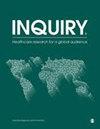Highlighting the Neuropsychological Consequences of COVID-19: Evidence From a Narrative Review
IF 1.7
4区 医学
Q3 HEALTH CARE SCIENCES & SERVICES
Inquiry-The Journal of Health Care Organization Provision and Financing
Pub Date : 2024-09-17
DOI:10.1177/00469580241262442
引用次数: 0
Abstract
The coronavirus disease 2019 (COVID-19), caused by the severe acute respiratory syndrome coronavirus-2, although largely affecting the respiratory system, commonly presents with numerous clinical symptoms from other systems. COVID-19 has been associated with both acute and persistent neurological abnormalities in a substantial proportion of patients. Notably, post-COVID-19 neuropsychological abnormalities have garnered attention, highlighting a high prevalence of neurocognitive issues in affected individuals. This narrative review synthesizes current knowledge on the neuropsychological impact of COVID-19, drawing insights from an extensive online search of published literature conducted in the PubMed (MEDLINE) and Scopus databases. The findings underscore significant neuropsychological effects of COVID-19 observed at both individual and societal levels during the ongoing pandemic. Neuropsychological deficits such as memory difficulties, attention problems, and executive dysfunction, alongside physical symptoms like headaches and fatigue were commonly reported. Additionally, psychological challenges, including fear, anxiety, and depression, emerged as prevalent issues arising from the uncertainties surrounding the situation, social isolation, and employment insecurities. The identified neuropsychological manifestations of COVID-19 can significantly impede normal cognitive and emotional functioning, potentially resulting in decreased productivity and an overall decline in mental health and quality of life. Early identification of signs indicative of neurological or psychological decline becomes imperative, offering a crucial opportunity to mitigate the risk of long-term neuropsychological dysfunction through the development of targeted interventions.突出 COVID-19 的神经心理学后果:叙事回顾中的证据
由严重急性呼吸系统综合征冠状病毒-2 引起的冠状病毒病 2019(COVID-19)虽然主要影响呼吸系统,但通常会出现其他系统的许多临床症状。在相当一部分患者中,COVID-19 与急性和持续性神经系统异常有关。值得注意的是,COVID-19 后的神经心理异常引起了人们的关注,凸显了受影响个体中神经认知问题的高患病率。这篇叙述性综述综合了目前有关 COVID-19 对神经心理学影响的知识,并从 PubMed (MEDLINE) 和 Scopus 数据库中对已发表文献的广泛在线搜索中汲取了见解。研究结果强调了 COVID-19 在大流行期间对个人和社会层面产生的重大神经心理学影响。除头痛和疲劳等躯体症状外,记忆障碍、注意力问题和执行功能障碍等神经心理学缺陷也被普遍报道。此外,恐惧、焦虑和抑郁等心理挑战也是普遍存在的问题,这些问题源于局势的不确定性、社会隔离和就业不安全感。已发现的 COVID-19 神经心理学表现会严重阻碍正常的认知和情绪功能,可能导致工作效率下降、心理健康和生活质量整体下降。当务之急是及早发现神经或心理衰退的迹象,通过制定有针对性的干预措施来降低长期神经心理功能障碍的风险。
本文章由计算机程序翻译,如有差异,请以英文原文为准。
求助全文
约1分钟内获得全文
求助全文
来源期刊
CiteScore
2.50
自引率
0.00%
发文量
192
审稿时长
>12 weeks
期刊介绍:
INQUIRY is a peer-reviewed open access journal whose msision is to to improve health by sharing research spanning health care, including public health, health services, and health policy.

 求助内容:
求助内容: 应助结果提醒方式:
应助结果提醒方式:


